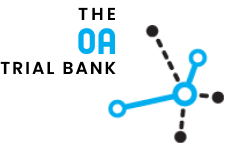Procedures
Protocol for analyses
The OA Trial Bank stimulates new initiatives and research questions from researchers and clinicians worldwide. New initiatives will all need to be approved by the steering committee of the OA Trial Bank by means of a (2-page) study protocol. This study protocol should at least include 1.) Background and study aims, 2.) proposed methods including study selection (type of studies, participants, type of interventions), variables, subgroups and outcomes of interest, and statistical analyses. All analyses done under the umbrella of the OA Trial Bank are predefined.
New initiated projects can make use of the structure of the OA Trial Bank in terms of support in study protocols, providing a license agreement for data-exchange, support in data-management, data analyses and provides storage of data.
Approval steering committee
The 2-page study protocols of new initiatives will be send towards all steering committee members of the OA Trial Bank. A final decision (positive or negative advice) will be made during a steering committee meeting. Consequently, PIs of proposed projects will be informed by the executive coordinator of the OA Trial Bank.
Data collection, transfer and storage
After a systematic search of the literature, all corresponding authors of eligible trials of new initiatives of the OA Trial Bank will be approached by the PI and asked to cooperate in this project. When the corresponding authors cannot be reached, the institutes in which the trials have been performed will be contacted. All data-delivers (i.e. the research institutes who own the data) that are willing to participate will be asked to sign the data delivery license agreement, including items on input data, obligations, ownership of data, terms, authorship, the statistical analyses and publications. The data will be transferred to the OA Trial Bank by digital secured transfer. Data sets will be accepted in any kind of electronic format (for example SPSS, Stata, SAS, Excel) or in paper form, provided that variables and categories are adequately labelled within the data set or with a separate code-book. The original data collection files collected by the coordinator will be kept in their original version and will be saved on a secured server at the Erasmus MC Medical University in Rotterdam, the Netherlands. To ensure the quality of the data, they will be independently checked for data entry mistakes and consistency and the sum of the individual patient results received will be compared with the published summary results from the primary studies. In case of differences, authors will be contacted and discrepancies should be resolved after discussion.
To ensure accurate pooling of data, all items will be consistently derived from the original databases. All anonymous data will be transferred to a secured database at the Erasmus MC Medical University in Rotterdam. The data set will not be used for any other research apart from that described in the study protocol (i.e. appendix of the license agreement).
Role of data-deliverers
Data Deliverer provides pseudonymised or anonymised digital data resulting from one or more clinical trials to the OA Trial Bank
The Data Deliverer grants the Erasmus MC a royalty-free, non-exclusive licence in respect of the data to import and include the data in the OA Trial Bank and allows to use and process the data for the predefined analyses.
The Data Deliverer will be contacted again and its permission will be requested for additional analyses not described in the protocol.
The Data Deliverer can play an active role:
- Where a Data Deliverer or one of its employees is willing to perform data analyses and is permitted to do so by the OA Trial Bank steering committee, the Data Deliverer and the executive coordinator will agree upon a timeframe for the analyses of the Data, writing a draft publication and submitting this publication to a renowned medical journal
- All data-deliverers will have the possibility to become a (co-)author on the publications derived from the analyses. All follow the criteria established by the International Committee of Medical Journal Editors.
